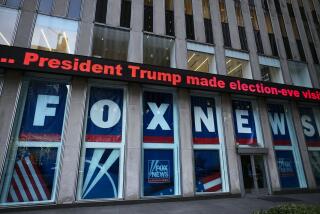Court to Rule on Burden of Proof in Libel : Will Decide if It Falls on Citizen or News Organization He’s Suing
- Share via
WASHINGTON — The Supreme Court, moving to resolve a longstanding constitutional issue in libel cases, said Monday that it would determine whether a private citizen--or the news organization he is suing--must prove the truth or falsity of an allegedly libelous statement.
In a brief order, the justices announced that they would review next term a Pennsylvania law that places the burden on libel defendants to show that the statement they published was true. The case was brought to the court by publishers of the Philadelphia Inquirer, the defendant in a libel suit for articles linking operators of a group of beverage firms to organized crime.
The court has held that under the First Amendment, public figures--such as politicians--have the burden to show the statements were false and published with the knowledge they were false or in reckless disregard for the truth.
Less-Demanding Standard
Private figures face a less-demanding standard: They can prevail when the statement is shown to be false and the result of negligence. But the court has never decided whether the Constitution puts the burden of proof for showing truth or falsity on the private figure or defendant. In 1981, the justices tried to resolve the issue in another case, but the suit at issue was settled out of court before the justices could rule.
Meanwhile, state courts have been widely divided on the issue. According to lawyers in the Pennsylvania case, four other states put the burden on the defendant. Sixteen more, including California, have ruled or implied that the burden is on the plaintiff. In the rest, there have been conflicting rulings or no rulings at all.
Although most of the most celebrated libel cases have involved officeholders, entertainers or other public figures, recent studies show that about half of the cases that now come to trial are brought by private figures--generally, those persons who have not sought public attention.
Stockholder Sues
The case before the court (Philadelphia Newspapers vs. Hepps, 84-1491) involves five news articles published by the Inquirer in 1975 and 1976. Maurice S. Hepps, the principal stockholder for one of the firms named in the articles, brought suit charging defamation.
A trial court judge ruled in 1983 that the state law placing the burden of proof on the defendants violated the First Amendment, and the jury upheld the newspaper. But the Pennsylvania Supreme Court overturned the ruling, upholding the state law and ordering a retrial.
The state court noted that news organizations in Pennsylvania defending libel actions were protected by a “shield” law enabling them to withhold the identity of sources of information. Because a plaintiff would be denied access to those sources, he would be “unfairly restricted” in trying to prove falsity if the burden were on him, the state court said.
The newspaper, appealing to the justices, said the burden should be on the plaintiff when free expression was at stake.
Will Rule on Rates
In another case to be heard next term, the justices agreed to decide whether the Federal Communications Commission may effectively force states to allow telephone companies to increase rates for intrastate phone service. The ruling could result in local rate increases involving hundreds of millions of dollars nationwide.
At issue is whether the authority of the FCC preempts state regulators in determining depreciation formulas for telephone equipment. A company’s depreciation costs are passed on to customers.
A federal appeals court upheld the FCC. A group of states, including California, challenged the ruling, saying such federal authority should be restricted to interstate service (Louisiana vs. FCC, 84-871; California vs. FCC, 84-889). In California, a rate increase application based on the FCC’s formula is pending before the state Public Utilities Commission, according to PUC attorney Gretchen Dumas.
More to Read
Get the L.A. Times Politics newsletter
Deeply reported insights into legislation, politics and policy from Sacramento, Washington and beyond. In your inbox twice per week.
You may occasionally receive promotional content from the Los Angeles Times.










